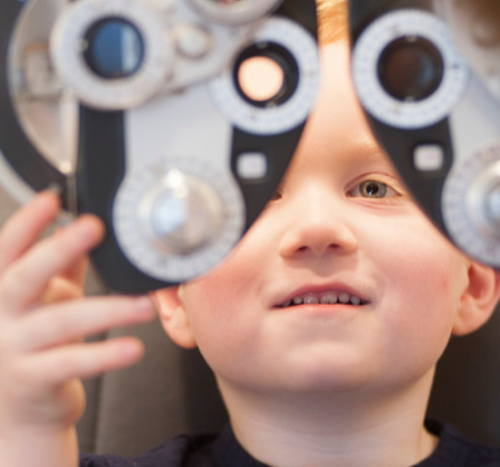Glaucoma is a leading cause of blindness worldwide, affecting an estimated 60 million people. Glaucoma is less common in children, but diagnosing and treating the disease is just as critical in avoiding permanent vision loss. Focus spoke with pediatric glaucoma specialist Dr. Daniel Vu about the condition, how it affects children and shared advice for parents and caregivers.
-
How and when does glaucoma occur?

Glaucoma is an irreversible disease that damages the optic nerve and can cause permanent vision loss if left untreated. The most common cause of the vision loss is eye pressure, which occurs due to a dysfunction of the eye’s natural drainage pathway, much like a clog in your sink. Typically, glaucoma occurs in elderly adults but can also affect children, which is known as pediatric glaucoma. In older adults, the drainage system becomes damaged over time, but in infants, the disease occurs due to poor development of the eye drainage system, which subsequently causes an increase in eye pressure.
-
How common is glaucoma in children?
Glaucoma is fairly uncommon in children. Primary congenital glaucoma is seen the most in children younger than four years old. It occurs in about 1 per every 10,000 infants, and is present at birth. Juvenile open-angle glaucoma (JOAG) is the most traditional form of glaucoma in children over the age of four and occurs at a rate of 1 per 50,000 kids. Since glaucoma is less common in children, not all glaucoma specialists have experience treating it.
-
Does glaucoma affect children differently than adults?
Glaucoma affects children under the age of four much differently than adults. High eye pressure can cause an infant’s eye to stretch, resulting in a large eyeball (globe), corneal clouding, and extreme near-sightedness in addition to optic nerve damage. Symptoms may include tearing, light sensitivity, and abnormally frequent blinking. In older children, the symptoms may be less obvious which is also common in adults. There is additional urgency with pediatric glaucoma because children have an increased risk of amblyopia, or lazy eye. Amblyopia occurs when one eye has decreased vision due to abnormal vision development in infancy or childhood.
-
What are the causes of pediatric glaucoma?
Pediatric glaucoma occurs when aqueous fluid, which is a thin, watery fluid located in the front of the eye, doesn’t drain out of the eye properly. There are both genetic and environmental factors that contribute to the development of pediatric glaucoma. We have a special clinical laboratory at Mass Eye and Ear that tests for genetic mutations that can help diagnose the specific type of pediatric glaucoma.
Glaucoma may also occur in association with other eye and systemic diseases, including congenital cataracts, Axenfeld-Rieger syndrome, and juvenile idiopathic arthritis. Sometimes in these cases, the patient is followed by a team of subspecialists, including a pediatric glaucoma specialist, to manage co-existing diseases.
-
How do you treat children with glaucoma at Mass Eye and Ear?
We will often monitor children with glaucoma by checking their eye pressure in the clinic. In high-risk patients, we will usually check eye pressure during an exam under anesthesia to help us make important decisions about treatment. Pediatric glaucoma is managed by lowering eye pressure to prevent vision loss, which can be done with eye drops or surgery, but the treatment will depend on the child’s type of glaucoma. In infants with uncontrolled glaucoma, they may need a type of surgery called a goniotomy or a trabeculotomy, in which the eye’s natural drainage pathway is treated to help increase the outflow of fluid.
-
Are there unique challenges when diagnosing and treating children?
Children may not know or be able to voice that they are having vision problems before seeing an eye doctor. If the eye pressure is difficult to check or the diagnosis is unclear, a child can see a few eye doctors before being referred to a pediatric glaucoma specialist.
In many cases, children with glaucoma need frequent eye exams, which can be difficult for families, especially if it involves significant traveling. Medicated eye drops are a common treatment for glaucoma, which can be challenging for children and parents initially, but pediatric glaucoma specialists are here to help parents become more comfortable with administering them. Some glaucoma medications cannot be used in infants, so it’s important to have a doctor with pediatric glaucoma experience determine the best possible treatment options.
-
What advice do you have for parents and caregivers?
After getting glaucoma under control, a child will still need regular follow-ups with his or her eye doctor to make sure that additional treatments are not needed. It’s also important that parents and caregivers closely follow the physician’s treatment recommendations. Here at Mass Eye and Ear, we have a team of specialists who strive to provide the best quality of care, education, and support to help patients, families, and caregivers with this chronic condition.
About Our Expert
 Dr. Daniel Vu is a member of the Glaucoma Service who specializes in both adult and pediatric glaucoma at Mass Eye and Ear. He performs both traditional and minimally invasive glaucoma surgeries, as well as laser treatments for glaucoma. He sees patients at the Longwood and Main Campus locations.
Dr. Daniel Vu is a member of the Glaucoma Service who specializes in both adult and pediatric glaucoma at Mass Eye and Ear. He performs both traditional and minimally invasive glaucoma surgeries, as well as laser treatments for glaucoma. He sees patients at the Longwood and Main Campus locations.
Good day Sir/Ma’am
Im writing this letter to consult the case of my son. He was born on May 25,2009 and after few months I found out that his eyes are not normal and not active like he will not look at you or follow the lights. I went to doctor and the diagnosis is he has morning glory syndrome which is rare case. The other eye can see but not clear and the other can see only the shadows of light. Please kindly help me with his condition. And im still hoping and praying that someday he can see well.thank you so much and God bless
Hi Jeneazelle, thanks for reading and your comment. We can’t offer medical advice over the blog, but if you are interested in arranging an appointment with a pediatric ophthalmologist for your son, you can call 617-573-3202. Visit here for more information: https://www.masseyeandear.org/specialties/pediatric-eye